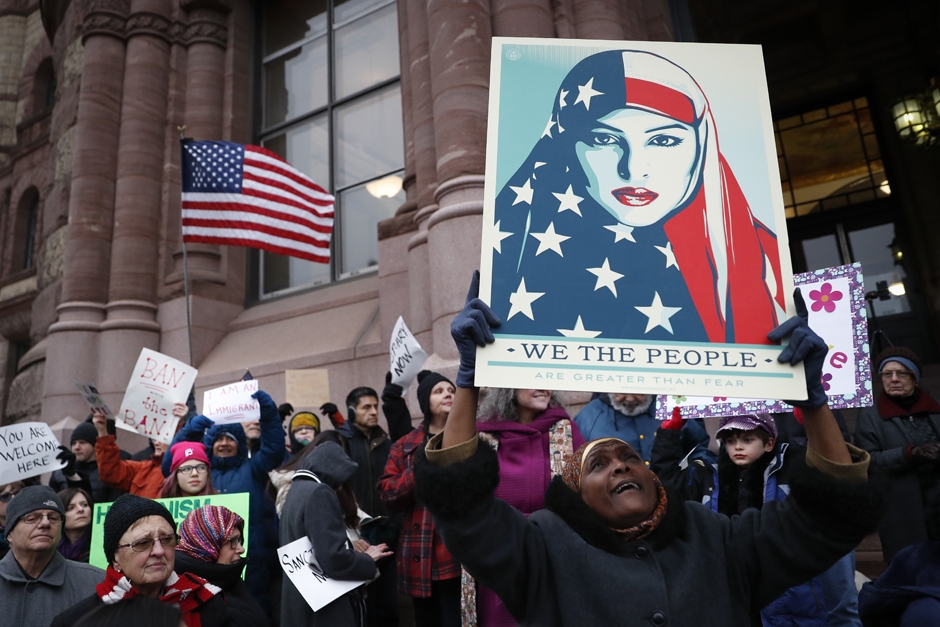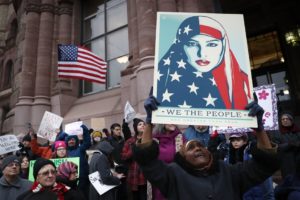
Demonstrators chant against President Donald Trump’s executive order on Jan. 30, 2017, outside City Hall in Cincinnati. Duquesne students discussed the order.

Demonstrators chant against President Donald Trump’s executive order on Jan. 30, 2017, outside City Hall in Cincinnati. Duquesne students discussed the order.
Raymond Arke | Asst. News Editor
As President Trump’s executive order on immigration faces legal questions in federal court, uncertainty abounds in Muslim populations on college campuses, including Duquesne’s.
Duquesne is home to six international students from Yemen, Egypt, Sudan, Somalia, Iran, Syria and Iraq — the seven Muslim-majority countries affected by the new immigration rules.
Joseph DeCrosta, director of Duquesne’s Office of International Programs, is tasked with overseeing international students on campus, including the six that are affected by the executive order.
When the executive order was initially announced, DeCrosta sent an email to all enlisted international students informing them of the situation and “advising them on how to think about the process.”
Since the legality of the immigration order is being debated in the U.S. Ninth Circuit of Appeals, the effects have been put on hold. DeCrosta describes this as putting everything in a “waiting pattern.”
“Right now we are proceeding as normal,” he said.
However, they have been advising the six students not to travel anywhere out of the country and have enlisted the help of a Duquesne-provided lawyer.
If the executive order does get upheld, DeCrosta warns that it would have a damaging effect on international students.
“It closes the door to them completely … [The order] sends a message to our counterparts that students may not be welcomed here,” he said.
To combat this, DeCrosta said that the office is launching a campaign, spearheaded by Temple University, that lets students know that they are always welcome here.
Fayezeh Haji Hassan, a third year law student at Duquesne and an Iranian immigrant, expressed criticism of the executive order. She is not one of the six students under advisement from the Office of International Programs.
Although she was born in Iran, her family had to flee when she was younger.
“My father was an activist in Iran. He was often detained [and] interrogated about every month,” she said.
Hassan’s family decided to move to Afghanistan, where her family has lived since. While there, she worked with the U.N.
When she lived in Afghanistan, Hassan helped run a school for girls out of their family home. They did this for two years and although they only taught the girls basic math and the alphabet, Hassan still described it as “playing with your life.”
“The Taliban was going around shutting down schools,” she said.
Hassan came to America on a scholarship to Middlebury College in Vermont and then came to Duquesne for law school.
She is strongly against the immigration efforts of the Trump administration.
“There is no basis for the executive order,” Hassan said.
What to call the order has elicited controversy, but Hassan describes it as a Muslim ban, based on Trump’s calling it a ban during the presidential campaign.
“You have to call a spade a spade. He has preferences for Christian [refugees],” she said, citing a provision of the order which prioritizes religious minorities from the affected counties.
For now, Hassan is inspired to stay in the U.S. and advocate for minority rights. But if she has to leave, she will.
“I want to stay here to fight. I have been kicked out of two countries and I’ve lived in five countries. If I have to find a sixth, I will,” she said. “I’m going to stay; I’m going to fight.”
Hassan says that the people from the affected countries she knows are ones that would benefit society.
“Everybody I know are scientists, Ph.D students. I don’t know any extremists,” she said.
However, not everyone agrees about the harm the order could create.
Colton Czack, a junior marketing major, is the president of the Duquesne College Republicans. He said that the club supports the immigration executive order.
“We believe that the executive order is a great thing for American citizens,” he said.
Though the order is popularly called a “ban,” including by President Trump, Czack believes that the term is wrong.
“The belief that this is a ‘Muslim ban’ is preposterous … This executive order actually only affects 13 percent of the Muslim population, specifically the 13 percent of Muslims in the countries that produce the highest number of extremists,” he said.
Czack said that they acknowledge there are people who do need help, however placing refugees in America just create more problems.
“Accepting this many refugees takes a toll on our communities … These people are placed in low-income communities,” Czack said. “What outcome do you expect when you place children, that may have never heard the English language before in an already failing school district?”
Czack thinks that famous people who support refugees should step up.
“It’s currently the cool thing in pop culture to take a pro-refugee stance, however I have yet to see a batch of immigrants placed in Hollywood, California,” he said, italicized emphasis his.
The money it costs to resettle a refugee should be used to focus on issues at home, Czack said. He points to “our 50,000 homeless vets, and failing [Veteran’s Affairs] and Social Security systems,” as pressing issues that people are “silent” about.
Duquesne College Republicans are hopeful that the executive order will benefit the country by making it safe.
“We believe that our government has been putting the interest of others over the welfare of our own citizens for a long time,” Czack said. “This order shows how much the new administration values our national security.”
A differing opinion comes from Gabriel Drexler, a junior double major in political science and international relations, president of Duquesne’s International Relations Club. On a personal level, Drexler believes the immigration actions are wrong.
“This political move by the current administration is a black-and-white solution to a problem that has always existed in shades of grey,” Drexler said.
No citizens from the seven countries on the list have been involved in a terrorist attack on American soil since 9/11, Drexler pointed out.
Drexler said that being welcoming to immigrants and refugees is a crucial part of America.
“Acceptance is the cornerstone of our country,” he said.
Speaking for the International Relations Club, Drexler said the club is open to all.
“The International Relations Club has always been a place where people of all backgrounds can come to talk about various international issues,” he said. “We believe that this decision to ban these countries because of the threat of terrorism causes many people to feel marginalized, not only in our country but abroad as well.”
The club doesn’t believe the the executive order will help build international relationships.
“Many nations look to the United States to lead the world by example, so we urge our lawmakers and the current White House administration to make decisions based on love, compassion, acceptance and courage,” Drexler said.
Brandon Addeo contributed reporting.




